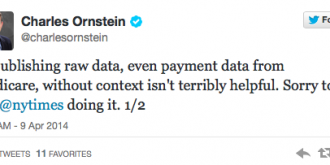The 7th Annual National Patient Safety Foundation and Lucian Leape Institute Forum and Gala was held last week in Boston, gathering patient safety leaders together to share knowledge, recharge and re-energize their efforts in making care safer for healthcare professionals and patients. The opening keynote, Using Informal Influence to Drive Positive Change in Healthcare, was given by Andrew Knight, PhD.
The 7th Annual National Patient Safety Foundation and Lucian Leape Institute Forum and Gala was held last week in Boston, gathering patient safety leaders together to share knowledge, recharge and re-energize their efforts in making care safer for healthcare professionals and patients. The opening keynote, Using Informal Influence to Drive Positive Change in Healthcare, was given by Andrew Knight, PhD. Assistant Professor, Organizational Behavior, Olin Business School, Washington University. Knight has studied innovation implementation, leadership and teams in high risk environments, such as the surgical suite, ICUs, Emergency Departments and the military.
 Knight’s talk provided a number of take home tools for healthcare leaders to approach internal change with new power. He supplied a different lens through which to view company politics, one that allows for consideration of “the other” versus leaving a footprint on even your mother’s forehead to reach the top. He shared insight into the influence skills and the collaboration across teams necessary to move quality and safety initiatives forward. And, he stressed that data alone has not been the sole catalyst for the large-scale adoption of change needed to make the healthcare workplace as safe as we need it to be, using the tragic story of Ignac Semmelweis as evidence. Many are familiar with Semmelweis’ story–the doctor who discovered hand washing as a “cure” for the high number of deaths related to childbirth in Vienna clinics. His findings at the time went against the medical community’s thinking of the day, with physicians even taking offense at the request to wash their hands before caring for a patient. Unable to convince, or influence, others of his findings during his lifetime, Semmelweis was ultimately committed to a psychiatric hospital at the age of 47, and beaten by guards two weeks after his arrival. As the story goes, Semmelweis died shortly after from the same infection he was trying to protect patients from through hand washing. This simple, cost-effective step in the delivery of care at the desired 100% adoption rate still eludes health systems today.
Knight’s talk provided a number of take home tools for healthcare leaders to approach internal change with new power. He supplied a different lens through which to view company politics, one that allows for consideration of “the other” versus leaving a footprint on even your mother’s forehead to reach the top. He shared insight into the influence skills and the collaboration across teams necessary to move quality and safety initiatives forward. And, he stressed that data alone has not been the sole catalyst for the large-scale adoption of change needed to make the healthcare workplace as safe as we need it to be, using the tragic story of Ignac Semmelweis as evidence. Many are familiar with Semmelweis’ story–the doctor who discovered hand washing as a “cure” for the high number of deaths related to childbirth in Vienna clinics. His findings at the time went against the medical community’s thinking of the day, with physicians even taking offense at the request to wash their hands before caring for a patient. Unable to convince, or influence, others of his findings during his lifetime, Semmelweis was ultimately committed to a psychiatric hospital at the age of 47, and beaten by guards two weeks after his arrival. As the story goes, Semmelweis died shortly after from the same infection he was trying to protect patients from through hand washing. This simple, cost-effective step in the delivery of care at the desired 100% adoption rate still eludes health systems today.
Additional takeaways from Knight’s talk include the following. He is an excellent speaker and the topic couldn’t be more timely for healthcare.
- When it comes to navigating the waters of company politics, do you consider yourself an innocent lamb, a straight shooter, a survivalist, company politician or Machiavellian? Knight asked the group to respond via a text message survey. Results showed a normal distribution, the majority claiming to be survivalists with one Machiavellian in the group, prompting Knight to tongue-in-cheek, warn all to watch their backs.
- A more realistic view of company politics was offered, such as: Instead of considering what tactics might be used to influence someone, walk a mile in their shoes to understand exactly how what you offer might affect another. Or, instead of kissing up to those in power, feel free to compliment those you admire!
- Driving positive change is hard work! A 2005 study showed more than 50% of attempts to implement innovations end in failure, and that over $500 Billion is wasted annually on new technology implementations, according to Morgan Stanley
- To implement change, groups outside one’s direct circle of influence need to buy-in, collaborate, support, and supply resources to be successful. Influence skills can help gain the buy-in!
- Informal influence at all levels of the organization is what makes for the successful adoption of new initiatives.
- A numeric equation to map the political landscape related to change was provided, quantifying the amount of current support for any given project, by any given stakeholder, indicating likelihood of success.
- “For most change initiatives we need commitment. Compliance is rarely enough.”





